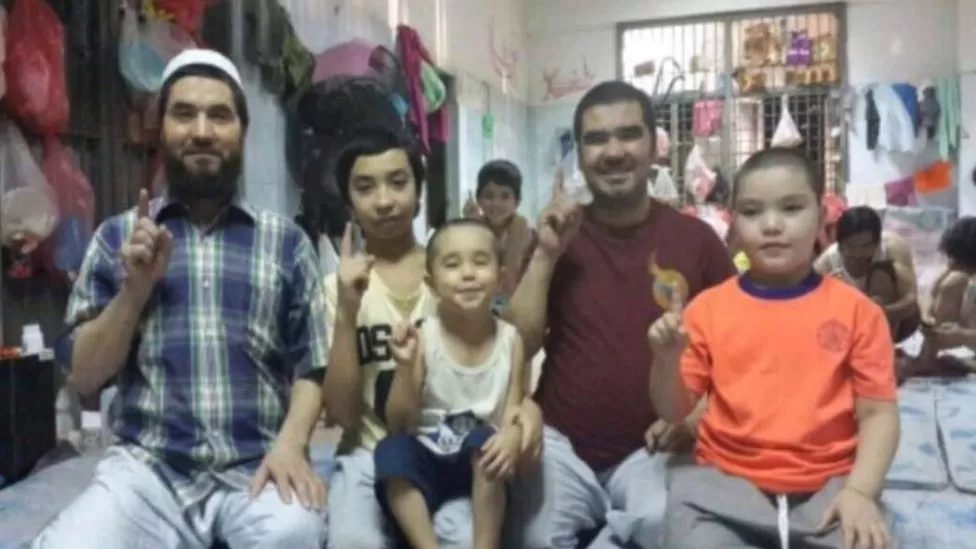
The recent death of a Uyghur asylum seeker detained in the Bangkok Immigration Detention Centre (Suan Phlu) has prompted renewed calls for Thailand to release a group of 49 ethnic Uyghurs who have now been detained in the country for nine years.
Aziz Abdullah, 49, died on 11 February after he collapsed in a cell in Suan Phlu. According to reports, he had complained of ill-health for more than four years and had been seriously unwell for three weeks–but detention staff had refused to take his condition seriously. Speaking to the New Humanitarian, Polat Sayim, the director of the World Uyghur Congress’s Refugees Center, reported that: “about three weeks ago, he started vomiting blood and could not eat food. Whatever he ate, he threw up.” It was only when he collapsed in a shared cell that staff took him to hospital, where he was pronounced dead.
Abdullah was part of a larger group of ethnic Uyghurs fleeing China who entered Thailand between 2013 and 2014. According to activists, they were attempting to reach Turkey when at least 350 of them–including children–were arrested and detained by Thai authorities. Despite Ankara’s reported willingness to receive the refugees, Thai authorities only permitted 173 to fly to Turkey. 109, meanwhile, were forcibly deported to China, prompting the then UN Special Rapporteur on Torture to express alarm that this amounted to refoulement, and would expose the group to the risk of torture. Since their deportation, there has been no information regarding the group’s fate.
The remaining (approximately) 50 Uyghurs, Abdullah amongst them, have remained confined in immigration detention in Thailand. Until 2022, they were held in a variety of facilities, but following an escape attempt they were all placed in Bangkok’s Suan Phlu.
Like most of Thailand’s detention centres, Suan Phlu is endemically overcrowded. Unsanitary cells are reportedly crammed with detainees who are held indefinitely (Thailand’s 1979 Immigration Act does not provide a maximum length for immigration detention), and detainees are denied appropriate food, physical exercise, or adequate medical treatment. Reports have highlighted detainees having to sleep standing up, and having to purchase all basic necessities themselves–even drinking water.
According to the World Uyghur Congress, the group of Uyghurs have also been kept in almost complete isolation–denied access to lawyers and UNHCR–which “fall below the legal and human rights standards set in Thai law.” The organisation has therefore called on the Thai government to not only investigate Abdullah’s death, but to “end the indefinite and arbitrary detention of this ground; release Uyghur refugees detained in Thailand; and Allow Uyghur refugees to access resettlement.”
Thailand has not ratified the 1951 Refugee Convention and does not have an asylum procedure. This leaves the nearly 100,000 refugees as well as many thousand asylum seekers and undocumented migrants vulnerable to abuses.
A coalition of NGOs and international organisations successfully lobbied the country to sign a memorandum of understanding (MOU) in 2019 on developing “alternatives to detention of children in immigration detention centres.” However, while the country reportedly released some children based on provisions in the MOU, it has continued to detain children and families. Despite maintaining an extensive system of degrading and often overcrowded detention centres, Thailand is regarded as a leading country in providing “promising practices” as part of the UN Network on Migration’s “peer learning” initiative concerning alternatives to detention.
Comments GDP Executive Director Michael Flynn: “Thailand has long been regarded as an exemplary case of a country willing to dialogue with civil society about finding ways to prevent harmful immigration detention measures, including promising to end the detention of asylum seeker families. As the case of Aziz Abdullah and the ongoing detention of dozens of Uyghurs demonstrate, the country remains light years away from being a respectful and conscientious actor when it comes to the treatment of the most vulnerable people in our societies. If Thailand wants to be a global leader, it should act like a global leader, hold true to its stated commitments, and end the nightmare of indefinite arbitrary detention. The best ‘promising practice’ when it comes to asylum seekers is not to detain them at all.”


